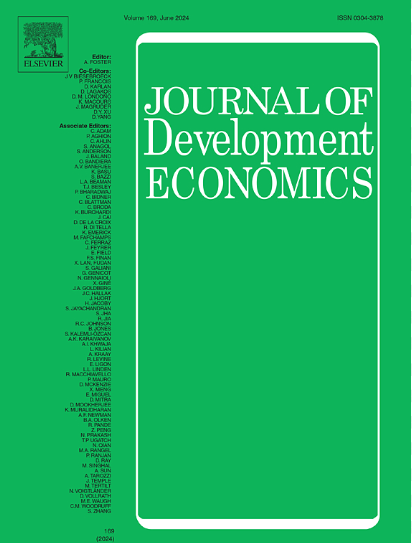发展中国家熟练劳动力和非熟练劳动力之间的替代弹性:一个定向技术变革的视角
IF 5.1
1区 经济学
Q1 ECONOMICS
引用次数: 0
摘要
我开发了一个发展中国家内生技能偏向的技术变革模型。对技能供给增加的内生反应抵消了传统的替代效应,抑制了供给在减少工资不平等方面的作用。该模型通过协调分散的现有估计,加强了对受教育程度较高/较低的工人之间替代弹性的共识估计。它还使迄今为止被认为不可信或理论不一致的估计合理化。我用一个新的全球面板和拉丁美洲的数据(便于动态分析)对发展中国家进行了新的估计。许多估计的弹性值几乎是2。这让我们对一个对不平等、增长和其他关键宏观经济问题至关重要的参数有了新的认识。本文章由计算机程序翻译,如有差异,请以英文原文为准。
The elasticity of substitution between skilled and unskilled labor in developing countries: A directed technical change perspective
I develop a model of endogenous skill-biased technical change in developing countries. The endogenous response to a rise in skill supply counters the traditional substitution effect and dampens supply’s role in reducing wage inequality. The model reinforces consensus estimates of the elasticity of substitution between more/less educated workers by reconciling dispersed existing estimates. It also rationalizes estimates that were hitherto deemed implausible or theory-inconsistent. I produce new estimates for developing countries with a new global panel and with Latin American data (that facilitates analysis of dynamics). Many estimated elasticity values are almost 2. This sheds new light on a parameter that is crucial for inequality, growth, and other key macroeconomic questions.
求助全文
通过发布文献求助,成功后即可免费获取论文全文。
去求助
来源期刊

Journal of Development Economics
ECONOMICS-
CiteScore
8.30
自引率
4.00%
发文量
126
审稿时长
72 days
期刊介绍:
The Journal of Development Economics publishes papers relating to all aspects of economic development - from immediate policy concerns to structural problems of underdevelopment. The emphasis is on quantitative or analytical work, which is relevant as well as intellectually stimulating.
 求助内容:
求助内容: 应助结果提醒方式:
应助结果提醒方式:


